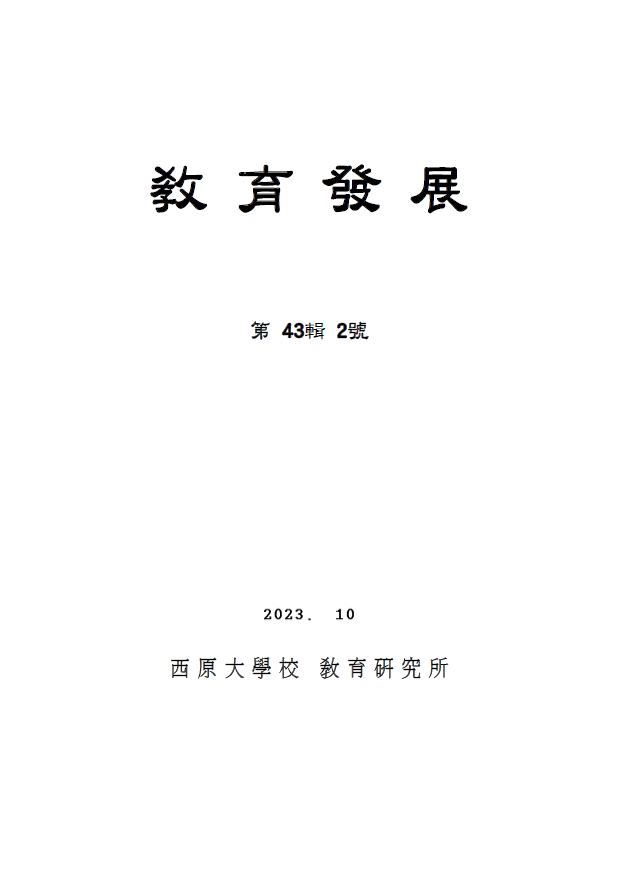영유아교사의 스트레스 대처 유형에 따라 성인애착이 자기자비에 미치는 영향의 차이
The Differences of the Influence of Adult Attachment on their Self-compassion of Teachers in the Early Childhood Education and Care According to Types of Stress Coping
- 서원대학교 사범대학 부설 교육연구소
- 교육발전
- 제43권 제2호
-
2023.10607 - 631 (25 pages)
- 173

본 연구는 영유아교사의 스트레스 대처 유형에 따른 성인애착 수준과 자기자비 수준의 차이와 영유아교사의 스트레스 대처 유형에 따라 성인애착이 자기자비에 미치는 영향의 차이가 있는지 알아보고자 실시되었다. 이를 위해 국내의 어린이집 및 유치원에서 현재 담임 또는 부담임으로 근무하는 490명을 대상으로 설문조사를 실시하였다. 자료 분석을 위해 PSS version 25.0 프로그램을이용하여 기술통계와 빈도분석, 일원배치 분산분석, Scheffé의 사후분석 및 Pearson의 적률상관분석을, Amos version 25.0 프로그램을 이용하여 확인적 요인분석과 다중집단분석을 실시하였다. 본연구의 주요 결과는 다음과 같다. 첫째, 영유아교사의 스트레스 대처 유형(과업중심, 정서중심, 회피중심)에 따라 성인애착 수준과 자기자비 수준의 차이는 각각 유의미한 차이를 보였다. 둘째, 과업중심과 회피중심으로 스트레스에 대처하는 영유아교사의 성인애착은 자기자비에 각각 유의미한정적 영향을 미치는 것으로 나타났다. 또한 과업중심 스트레스 대처 유형에 속하는 영유아교사의집단이 회피중심 스트레스 대처를 하는 집단에 비해 성인애착이 자기자비에 미치는 영향이 더 큰것으로 나타났다. 즉 영유아교사의 안정적인 성인애착 형성은 자기자비 수준을 높이고 영유아교사의 스트레스 대처 유형 중 과업중심 대처는 이러한 영향을 강화시켜 준다는 것을 시사한다.
The purpose of this study is to investigate differences in the adult attachment and self-compassion l evels of early childhood teachers according to their stress coping style, the effect of adult attachmen t on self-compassion, and differences in the effect of adult attachment on self-compassion in early c hildhood teachers according to their stress coping style. The survey was conducted with 490 early c hildhood teachers who had been working as homeroom teachers or assistant teachers at daycare cen ters and kindergartens in Korea. Data was analyzed using the SPSS 25.0 program with descriptive s tatistics, frequency analysis, one-way ANOVA, Scheffé's post hoc test, and the Pearson product-mo ment correlation coefficient. In addition, confirmatory factor analysis and multiple group analysis wer e performed using the AMOS 25.0. The results of this study are as follows: First, regarding the diff erences between adult attachment and self-compassion levels in the early childhood teachers, signific ant differences were found according to their stress coping styles, including task-oriented, emotion-o riented, and avoidance-oriented styles. Adult attachment levels showed significant differences in emo tion-, task-, and avoidance-oriented styles. Self-compassion levels also showed significant difference s in all three types. Second, the adult attachment levels of the survey participants with task- and a voidance-oriented coping styles showed a significant positive effect on self-compassion. In addition, the effect of the early childhood teachers’ adult attachment on self-compassion showed a significant difference according to their stress coping style; the adult attachment of the group with a task-orien ted coping style had a greater effect on self-compassion than that with an avoidance-oriented copin g style. This implies that the formation of stable adult attachment in early childhood teachers increa ses self-compassion levels and that task-oriented coping style further enhances such an effect.
Ⅰ. 서 론
Ⅱ. 연구방법
1. 연구대상
2. 연구도구
3. 연구절차
4. 자료분석
Ⅲ. 연구결과
IV. 논의 및 결론
참고문헌
ABSTRACT
(0)
(0)